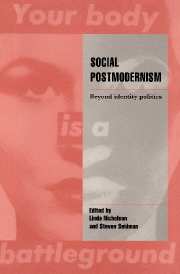Book contents
- Frontmatter
- Contents
- Notes on contributors
- Acknowledgements
- Introduction
- Part I Critiques of identity
- Part II Critiques of the deconstruction of identity
- 4 African identities
- 5 Deconstructing queer theory or the under-theorization of the social and the ethical
- 6 Queer visibility in commodity culture
- Part III Postmodern approaches to the social
- Part IV Postmodern approaches to the political
5 - Deconstructing queer theory or the under-theorization of the social and the ethical
Published online by Cambridge University Press: 29 October 2009
- Frontmatter
- Contents
- Notes on contributors
- Acknowledgements
- Introduction
- Part I Critiques of identity
- Part II Critiques of the deconstruction of identity
- 4 African identities
- 5 Deconstructing queer theory or the under-theorization of the social and the ethical
- 6 Queer visibility in commodity culture
- Part III Postmodern approaches to the social
- Part IV Postmodern approaches to the political
Summary
From at least the early 1950s through the mid-1970s, the idea was widespread in American society that what was called homosexuality was a phenomenon with a uniform essential meaning across histories. Both mainstream America and the homosexual mainstream assumed that homosexuality marks out a common human identity. Public dispute has centered on the moral significance of this presumed natural fact. Whereas the post-World War II scientific, medical, and legal establishment routinely figured homosexuality as signaling a psychologically abnormal, morally inferior, and socially deviant human type, homophile groups and their supporters defended the “normality” of “the homosexual.” Even the mainstream lesbian and gay movements of the 1970s primarily contested stereotypes of homosexuality, not the notion that “the homosexual” is a distinct human type. Public struggles easily folded into friend-versus-foe of the homosexual.
Since the late 1970s, the terms of the struggle over “homosexuality” have changed dramatically. The assumption that “homosexuality” is a uniform, identical condition has given way to the notion that the meaning of same-sex sexual desire varies considerably within and across societies (e.g., by class, race, ethnicity, or subcultural identity). By the early 1980s, it had become conventional wisdom among many intellectuals at least that the meaning and therefore the experience of same-sex sexuality articulates a social and historical, not a natural and universal, logic.
One consequence of the “constructionist” questioning of “essentialism” has been the loss of innocence within the gay community. The presumption of a lesbian and gay community unified by a common baseline of experience and interest has been placed into seemingly permanent doubt.
- Type
- Chapter
- Information
- Social PostmodernismBeyond Identity Politics, pp. 116 - 141Publisher: Cambridge University PressPrint publication year: 1995
- 66
- Cited by

